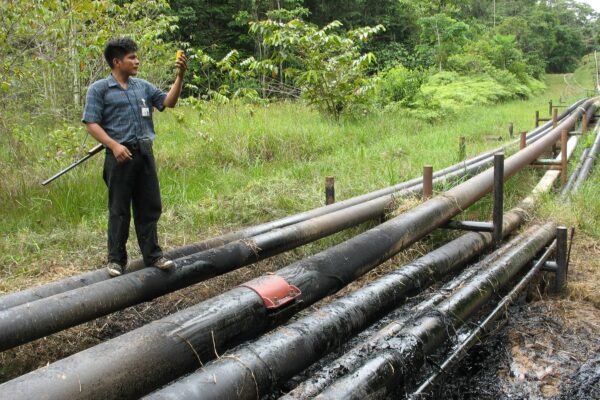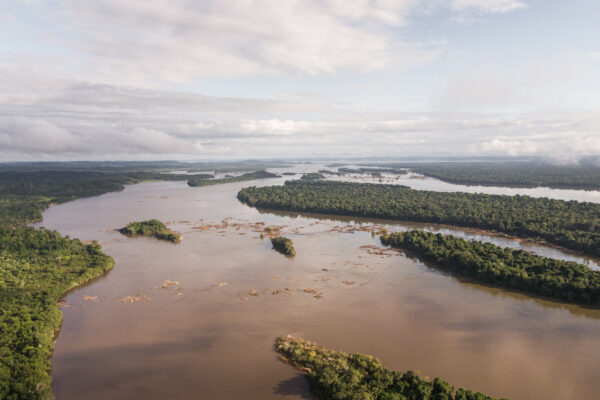The Kichwa people of Sarayaku, Ecuador won two major victories this year: in April, for the first time in their history, the government of Ecuador acknowledged responsibility for illegally licensing an oil company to do business on indigenous territory without the community’s consent; and in July the Interamerican Court of Human Rights (ICHR) ruled that the government must consult with indigenous communities prior to such enterprises and pay for physical and ‘moral’ damages to the community.
The story of this struggle is now on film.
The ten-year effort of the Sarayaku community to protect their land from oil companies and illegal government intrusions has been captured by Kichwa filmmaker Eriberto Gualinga of the affected Sarayaku community.
Gualinga created Children of the Jaguar, the winner of this year’s Best Documentary at the 2012 National Geographic All Roads Film Festival held September 27 – 30 in Washington, D.C. The 35-year old filmmaker co-produced the work along with Amnesty International.
The 30-minute documentary was featured in the All Roads Film Festival in late September, and then in other screenings throughout Washington, D.C. and elsewhere in the first week of October.
Children of the Jaguar tells the story of the Amazonian Kichwa community’s battle against oil companies and the government of Ecuador starting in 2002.
The documentary starts with scenes of the Kichwa delegation arriving and then testifying before the ICHR in Costa Rica, where they explain how their culture and identity is closely connected with the Amazonian forest and the Bobonaza River that borders their villages.
“We know our rights and we’re defending them,” said Gualinga in the opening narration, set in the ICHR courtroom and leading into testimony by various community leaders.
The story then shifts back to the tribe’s village in the lush Amazonian region of Ecuador, with scenes of flowers, forest, the river, families cooking, kids playing and young me hunting. It is in this segment that viewers are introduced to Gualinga.
The documentary then moves quickly into the appearance of first oil company helicopters and then Ecuadorian military in their territory. As these outside forces appear on screen, narrator Gualinga states, “Our way of life was turned upside down in those months.”
After much time of trying to negotiate with soldiers and a variety of local, regional and national officials, the community finds assistance with an attorney at the Pachamama Foundation in Ecuador, and later with attorneys at the Washington D.C. based Center for Justice and International Law (CEJIL), they proceed to another phase of their effort.
From press conferences to radio and TV appearances, Kichwa leaders then make it to the climactic scenes in the ICHR courtroom where the movie ends with the Kichwa plaintiffs and their attorneys expressing hope for the verdict but before the court’s ruling in favor of the community.
In an interview following the All Roads Festival screening Gualinga said he was inspired by how the documentary was being received by different audiences.
“The fact that my film was recognized in various festivals gives me strength to go forward with other works in defense of the Amazon and the rights of the First Peoples,” the 35 year old filmmaker said while in the office of Amazon Watch (AW) in Washington, D.C. (AW provided help with promotion and transportation of the community).
“I am happy to share with society the struggle of our people, so that the world will know what is happening to the Indigenous Peoples,” he added.
While the Kichwa of Sarayaku have won this battle, CEJIL Attorney Alejandra Vicente pointed out that 70 days after the ICDH sentence, the government of Ecuador has yet to comply at all with the ruling that they must pay $90,000 for material damages, $1,250,000 for moral damages and to remove the more than 1 ton of dynamite still buried around the community.













